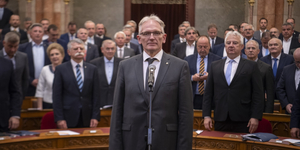Tamas Kolosi on Lex Mol and the unfinished regime change
The law known as Lex Mol, whose declared aim is to protect Hungary's strategic companies, has stirred up a hornet's nest. Some believe the law presages the advent of the Russian capitalist model. We asked the sociologist Tamas Kolosi, who researches the Hungarian social elite, to discuss whether Hungarian oligarchs exist. His answer has implications for people on the lower rungs of society and for party financing.
© hvg.hu |
There is no oligarchy - in fact, we have the opposite in certain senses. Civic societies are constructed of two key strata - the owners and the intellectuals. It seems to me that one of the fundamental problems of the Hungarian regime change is that there was no property-owning class before 1990. The regime change was brought about by the intellectuals, under their leadership and active participation. I'm thinking not just of those who played a prominent role, but of a much broader spectrum of people, because the intellectuals furnished the real basis for the regime change, and the intellectuals ruled politics in that period. This is shown by the composition of parliament at the beginning of the 1990s - and by the fact that the then prime minister was a historian. This was rule by the intellectuals.
I said then that if we want to build a modern civic society, then we have to change this one-sidedness. This means not just building up capital, making greenfield investments and carrying out privatisations, but also preparing ourselves for the property-owning class wielding influence.
It wasn't hard to predict the emergence of a property-owning class in Hungary, following the west European model of political generations. We followed the German-Austrian model, but also the Italian, Spanish, Portuguese and Greek models to some extent. In modern civic societies, the property-owning class's influence is stronger than the intellectuals'. Elsewhere, a kind of consensus emerged between the entrepreneurs and the intellectuals, but the intellectuals did not have the kind of excessive power they held in Hungary in the 1990s.
The conclusions of intellectual preponderance (Oldaltörés)
The intellectuals' preponderance clearly distorted the power structures, and it may have changed the way the public looked at the state. What were the consequences of this one-sided regime change?
It had two negative consequences. Once results from the fundamentally differing attitudes of the property-owning and intellectual classes. The property-owning class is interested in utility: what is good for me, what benefits me, what creates profit. The intellectuals are interested inhuman values. In the 1990s, therefore, a conception of what was good for individuals, for companies and the country itself was lost. Values questions came into the foreground, as did battles over morality.
Lajos Bokros wrote in 2005 that new democracies like Slovakia, Croatia, Serbia, Romania, Bulgaria, Ukraine and Russia had seen an incredibly swift emergence of national oligarchies. Insiders who went from being company directors to company owners immediately found a route to the directors of the finance houses, which were still state-owned, to local government leaders and to governments. wrote that democratic governments had more or less success dealing with this frightful dual inheritance - the communist system and the legacy of oligarchy which had proven to be a blind alley. The greatest achievement, even if it came late, was to break this oligarchic structure with a successful liberalisation programme.
I don't want to diminish the role played by some politicians in creating the ugly public discourse we now have, but there is a structural reason as well. If a society is founded on values, then that society will be dominated by moral arguments. In such a society, ideological differences run very deep. One negative consequences is that for 15 years, utility played second fiddle to values.
Another negative consequence was that the regime change ran its course in all those areas where the intellectuals were not directly involved. From agriculture to industry, in the services sector - everywhere, a market economy replaced socialist redistributive economics. Realising that this had a price, the regime-changing intellectuals had bad feelings about this, but they didn't make a fuss. That a third of workers in heavy industry lost their jobs was accepted as a price of the regime change. But there are lots of areas where intellectuals had a direct interest. And there, they did not let changes run their course, even preventing them from taking place. If a teacher or a doctor became unemployed, the whole of Hungarian public life was outraged.
So the major spending portfolios - education, health - and public administration, scientific research, art - were spared the influence of market conditions and the logic of the regime change. We still feel the consequences of that today. The leaders of the main opposition party continue to say that culture is not a product. It's like hearing an echo of the Hungarian Socialist Workers' Party. And it's still because the intellectuals' excessive power prevented the regime change from taking place, and continues to fight a rearguard action against the government parties' reform plans.
Lex Mol appears to borrow from the utilitarian and values perspectives. Or is this law about utility only?
Over recent years, there have been signs that the property owners have become so strong that they are becoming the major influences on political life. We can see this from the fact that many entrepreneurs are are taking on political roles, by the way Gabor Szeles is building a media empire, and the way the banker Sandor Csanyi's name is often mentioned in a political context. So there are clear tendencies towards the entrepreneurial class trying to influence political life for its own utility. And they are no longer going up fighting against values perspectives. Values did play a role in Lex Mol's inception. I couldn't tell you to what extent Lex Mol reflects national values, or how much it serves the interests of a particular group, but it is clear that these tendencies should not be confused with the oligarchic tendencies you see in Russia's development. Furthermore, the limits to the Russian oligarchs' political influence is well illustrated by the fate of the energy giant Yukos and its former owner, Mikhail Khodorkovsky.
A property-owning class emerges in many different ways. What happened in Hungary is the most democratic and best route, while Russia's approach was far less satisfactory, since privatisation was the main factor. The proof of this is that the list of the richest central and east Europeans contains few Hungarians, although it is packed with Russians. In Hungary, property acquisition was a far more organic part of the overall social changes.
Private interests and fundraising mechanisms (Oldaltörés)
© hvg.hu |
I really don't like the idea that there are private interests and public interests, and that the two are fundamentally opposed. I believe that in a democratic society, public interests are the sum of all private interests. There is no contradiction between them, but they influence each other in a very complicated way. Lex Mol caters to private interests, certainly, and the law is being used to defend those. But one of the purposes of the law is to combine private interests. It is hard to say what private interest opposes public interests, or what private interest is a reflection of public interest. In the case of Lex Mol, much of the focus was on the security of the country's energy supply. But I can see another principle. Within the EU, there is no great significance to the question of which company provides Hungary's energy. But it may matter that Hungary only has one group of companies that has a chance of developing into a real multinational company in the short term, and that is Mol-OTP. It matters whether we allow this to happen or not. This is a less easily comprehensible matter for public opinion, so it gets less of a political airing. But it's important. At the beginning of the 1990s, the government consciously aimed to create national capital. I also believe that a modern society cannot work without national capital.
A lack of national capital, and the competition of the multinationals, meant Hungarian players only really had opportunities on the domestic market. It matters whether Hungarian companies can escape the domestic market to become important players abroad, with a Hungarian headquarters and Hungarian management. For this reason, I think the Mol-OMV conflict is more important than the question of Hungary's energy supply. I can't disagree with Lajos Bokros's view that private interests and public interests are being conflated, but I don't think that's a problem.
In Hungary, party-linked countries and entrepreneurs are an accepted part of the landscape. Indeed, the public assumes it knows which political camp a company belongs to. Can't these people bend legislation in their direction, as Bokros suggests?
There are three different aspects. One is that entrepreneurs can have political sympathies linking them and their company to a particular political camp. But this can be deceptive. In Gabor Szeles's media empire, for example, political allegiance matters, but not in Videoton, his other company. But there's more to it. The next factor is that companies and entrepreneurs are linked not just to parties but also the state and to the state's instruments. It's said that the Frankfurt money-changer Rothschild, the founder of the later banking dynasty, told his son: "If you want your company to be safe and to live a quiet life, then do no business with the state! But realise that, if you want to become rich, then you must do business with the state!" Above a certain level of capitalisation it is necessary to do business with the state. That also means that you are doing business with a particular government, and the government always has a party political colour. So it happened that superficial observers thought Sandor Demjan was a Fidesz man under the Fidesz government, while they now think he's a Socialist - because he does business with the government, whichever party it is.
The third element is the most problematic. It only concerns a small part of the entrepreneurial sector, but it is all the more striking for that. The European and Hungarian political systems are very hypocritical. Politicians think that people should not be allowed to mention that maintaining a democracy is a very expensive business. In the world of modern communications, an electoral campaign costs a fortune, and politicians pass hypocritical laws allowing only a fraction of the real sums to be spent. This means that party finance related corruption is so general in Europe (the Scandinavian countries are a partial exception), that the people who compile international corruption rankings hardly notice it, since it is no longer a distinguishing factor between countries.
This illegal fundraising is carried out by people linked to the various parties. They risk getting caught and ending up in prison, so they aren't doing it for free. For that reason, it's of great significance that much of this party money ends up in people's pockets. There are party soldiers who take a very balanced approach, and others are much more daring and end up being caught. There have been plenty of examples of this happening in Hungary over the past 15 years. The result is that many of those ambitious entrepreneurs end up doing business with the state and find themselves in that corrupt party fundraising machine. This is one of the darkest phenomena in public life. I think almost every European country has to deal with this problem.
The extent of political corruption (Oldaltörés)
the government parties' advantage is nearer 60:40 than 70:30 © hvg.hu |
It would be hard to say how affected Hungary is, because the sums concerned are invisible. But I suspect political corruption is more endemic in Hungary than elsewhere, because this hypocrisy is stronger here than in other countries. One thing could change this: if politicians would declare honestly how much democracy costs, the price of an electoral campaign, and then designed a law that accommodated this. But the recent nonsense about banning serving concurrently as a mayor and an MP, or banning companies from making party contributions while allowing private individuals to do so - these just make accentuate the problem.
There is much information because it is impossible to get precise data. There is no honest dialogue about party finance - just much gossip and scandal. Much of the gossip is exaggerated. It is not true that the Socialists have more money than the other side or that one side is more embedded in power.
I assume that every party is involved in this kind of fundraising. There's no question that those in power have more power to do so. But I'd estimate that the government parties' advantage is nearer 60:40 than 70:30. There is also a difference in that, if a party is more centralised, then the fundraising also has to be more centralised. So a decentralised party can involve far more people and far more pockets in this kind of illegitimate fundraising.
You mean it makes no difference in the long run, because the funds available to the different camps will equalise over the longer term as different parties get into power? So the whole argument is staged for the benefit of voters and party faithful?
I don't think these are entirely theatrical arguments - there are very important issues. At the beginning of the 2000s, two very striking political figures emerged, and their conflict lent a viciousness to political debate - but the structure of our political system had already made public life vulnerable to such a shift. It is more an ideological struggle than one about business interests or utility. The problem is populism and political paralysis, which people are fed up with. But not everybody is fed up. You have to see that the camps themselves are structured. Out of 8m voters, 3m are not interested in politics and don't vote. Of the remaining 5m, 1m belongs to one camp and 1.5m to the other. The 2.5m people who are politically active without being committed are disgusted by the foul stench of public life.
Zoltán Meixner


















